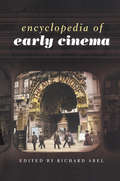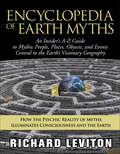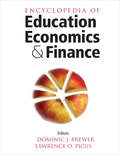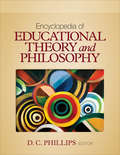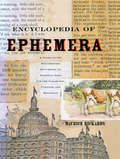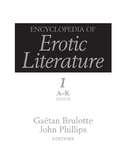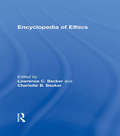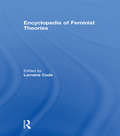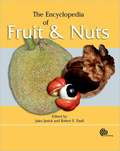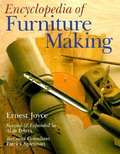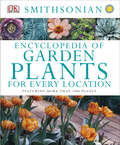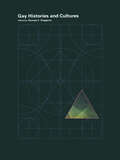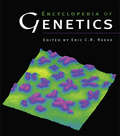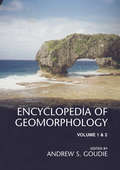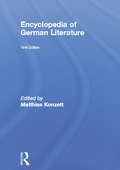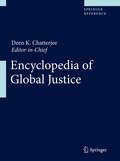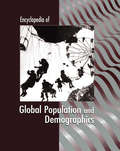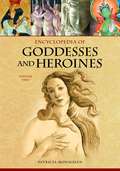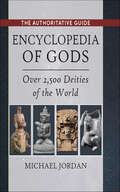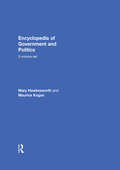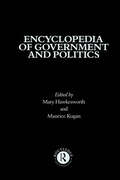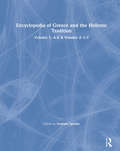- Table View
- List View
Encyclopedia of Early Cinema
by Richard AbelThis encyclopedia presents a wealth of information on early cinema history, with coverage of the techniques and equipment of film production, profiles of the pioneering directors and producers, analysis of individual films and the rapid growth of distinct film genres, and the emergence of something the world had never seen before - the movie star.The work also focuses on how the nature of film exhibition changed as the industry grew, and how the public's reception to films also changed. The pre-cinema period is closely examined to show those mass-cultural forms and practices - such as music hall and vaudeville - from within which cinema was to emerge. A perfect companion for any student of early cinema and film studies.
Encyclopedia of Earth Myths: An Insider's A–Z Guide to Mythic People, Places, Objects, and Events Central to the Earth's Visionary Geography
by Richard LevitonDiscover what secrets myths from twenty-one different cultures from around the world reveal about our planet in this A to Z guide.Richard Leviton has become the pre-eminent authority on sacred sites and visionary geography. Through books such as Signs on the Earth, The Emerald Modem, and The Galaxy on Earth, he has explored both the personal and universal aspects of our connection to the planet. Now he shows in Encyclopedia of Earth Myths how many of the oldest and most evocative of the world’s myths contain a secret about the Earth. They tell something vital about its make-up and history and our long-standing human relation to it.Encyclopedia of Earth Myths offers a unique blueprint for understanding world mythology. Carl Jung and Joseph Campbell tutored us in the psychological relevance of myths and the universality of their themes. Now Richard Leviton shows us how they reveal hidden clues about the Earth’s spiritual landscape.Using clairvoyance and scholarship, Leviton examines 153 mythic topics in A-Z fashion drawn from twenty-one cultures to tease out their information about Earth’s secret landscape. Each entry shows how something considered merely mythic—dragons, giants, the Minotaur, Holy Grail, Fountain of Youth, Golden Apples—actually decodes and illuminates the planet’s esoteric make-up.Whether it’s African, Tibetan, Native American, Hindu, Peruvian, Egyptian, Greek, or one of fourteen other cultures, myths of many cultures all point to the planet. It’s as if clues about the Earth’s visionary geography have been scattered in all cultures, awaiting our retrieval and decoding.Encyclopedia of Earth Myths is also a practical tutorial for a new subject: our Earth. But this is virtually a new planet we’re being introduced to here. The result is an essential reference for anyone interested in world mythology who wants to look beyond the cloak of mythic symbolism and see the world anew.
Encyclopedia of Education Economics and Finance
by Dominic J. Brewer Lawrence O. PicusEconomics can be a lens for understanding the behavior of schools, districts, states, and nations in meeting education needs of their populaces, as well as for understanding the individual decisions made by administrators, teachers, and students. Insights from economics help decision makers at the state level understand how to raise and distribute funds for public schools in an equitable manner for both schools and taxpayers. Economics also can assist researchers in analyzing effects of school spending and teacher compensation on student outcomes. And economics can provide important insights into public debates on issues such as whether to offer vouchers for subsidizing student attendance at private schools. This two-volume encyclopedia contains over 300 entries by experts in the field that cover these issues and more. Features: This work of 2 volumes (in both print and electronic formats) contains 300-350 signed entries by significant figures in the field. Entries conclude with cross-references and suggestions for further readings to guide students to in-depth resources. Although organized in A-to-Z fashion, a thematic “Reader’s Guide” in the front matter groups related entries by topic. Also in the front matter, a chronology provides students with historical perspective on the development of education economics and finance as a field of study The entire work concludes with a Resources appendix and a comprehensive Index. In the electronic version, the index, Reader's Guide, and cross references combine to provide effective search-and-browse capabilities.
Encyclopedia of Education Economics and Finance
by Dominic J. Brewer Lawrence O. PicusEconomics can be a lens for understanding the behavior of schools, districts, states, and nations in meeting education needs of their populaces, as well as for understanding the individual decisions made by administrators, teachers, and students. Insights from economics help decision makers at the state level understand how to raise and distribute funds for public schools in an equitable manner for both schools and taxpayers. Economics also can assist researchers in analyzing effects of school spending and teacher compensation on student outcomes. And economics can provide important insights into public debates on issues such as whether to offer vouchers for subsidizing student attendance at private schools. This two-volume encyclopedia contains over 300 entries by experts in the field that cover these issues and more. Features: This work of 2 volumes (in both print and electronic formats) contains 300-350 signed entries by significant figures in the field. Entries conclude with cross-references and suggestions for further readings to guide students to in-depth resources. Although organized in A-to-Z fashion, a thematic “Reader’s Guide” in the front matter groups related entries by topic. Also in the front matter, a chronology provides students with historical perspective on the development of education economics and finance as a field of study The entire work concludes with a Resources appendix and a comprehensive Index. In the electronic version, the index, Reader's Guide, and cross references combine to provide effective search-and-browse capabilities.
Encyclopedia of Educational Theory and Philosophy
by Professor D. C. PhillipsEducation is a field sometimes beset by theories-of-the-day and with easy panaceas that overpromise the degree to which they can alleviate pressing educational problems. The two-volume Encyclopedia of Educational Theory and Philosophy introduces readers to theories that have stood the test of time and those that have provided the historical foundation for the best of contemporary educational theory and practice. Drawing together a team of international scholars, this invaluable reference examines the global landscape of all the key theories and the theorists behind them and presents them in the context needed to understand their strengths and weaknesses. In addition to interpretations of long-established theories, this work offers essays on cutting-edge research and concise, to-the-point definitions of key concepts, ideas, schools, and figures. Features: Over 300 signed entries by trusted experts in the field are organized into two volumes and overseen by a distinguished General Editor and an international Editorial Board. Entries are followed by cross references and further reading suggestions. A Chronology of Theory within the field of education highlights developments over the centuries; a Reader’s Guide groups entries thematically, and a master Bibliography facilitates further study. The Reader’s Guide, detailed index, and cross references combine for strong search-and-browse capabilities in the electronic version. Available in a choice of print or electronic formats, Encyclopedia of Educational Theory and Philosophy is an ideal reference for anyone interested in the roots of contemporary educational theory.
Encyclopedia of Educational Theory and Philosophy
by Professor D. C. PhillipsEducation is a field sometimes beset by theories-of-the-day and with easy panaceas that overpromise the degree to which they can alleviate pressing educational problems. The two-volume Encyclopedia of Educational Theory and Philosophy introduces readers to theories that have stood the test of time and those that have provided the historical foundation for the best of contemporary educational theory and practice. Drawing together a team of international scholars, this invaluable reference examines the global landscape of all the key theories and the theorists behind them and presents them in the context needed to understand their strengths and weaknesses. In addition to interpretations of long-established theories, this work offers essays on cutting-edge research and concise, to-the-point definitions of key concepts, ideas, schools, and figures. Features: Over 300 signed entries by trusted experts in the field are organized into two volumes and overseen by a distinguished General Editor and an international Editorial Board. Entries are followed by cross references and further reading suggestions. A Chronology of Theory within the field of education highlights developments over the centuries; a Reader’s Guide groups entries thematically, and a master Bibliography facilitates further study. The Reader’s Guide, detailed index, and cross references combine for strong search-and-browse capabilities in the electronic version. Available in a choice of print or electronic formats, Encyclopedia of Educational Theory and Philosophy is an ideal reference for anyone interested in the roots of contemporary educational theory.
Encyclopedia of Ephemera: A Guide to the Fragmentary Documents of Everyday Life for the Collector, Curator and Historian
by Maurice Rickards Michael Twyman Sally De Beaumont Amoret TannerThe joy of finding an old box in the attic filled with postcards, invitations, theater programs, laundry lists, and pay stubs is discovering the stories hidden within them. The paper trails of our lives -- or ephemera -- may hold sentimental value, reminding us of great grandparents. They chronicle social history. They can be valuable as collectibles or antiques. But the greatest pleasure is that these ordinary documents can reconstruct with uncanny immediacy the drama of day-to-day life.The Encyclopedia of Ephemera is the first work of its kind, providing an unparalleled sourcebook with over 400 entries that cover all aspects of everyday documents and artifacts, from bookmarks to birth certificates to lighthouse dues papers. Continuing a tradition that started in the Victorian era, when disposable paper items such as trade cards, die-cuts and greeting cards were accumulated to paste into scrap books, expert Maurice Rickards has compiled an enormous range of paper collectibles from the obscure to the commonplace. His artifacts come from around the world and include such throw-away items as cigarette packs and crate labels as well as the ubiquitous faxes, parking tickets, and phone cards of daily life.As this major new reference shows, simple slips of paper can speak volumes about status, taste, customs, and taboos, revealing the very roots of popular culture.
Encyclopedia of Erotic Literature
by John Phillips GaThe Encyclopedia of Erotic Literature is a two-volume work that contains some 540 entries on erotic literature on an international scale. The Encyclopedia has an unprecedented scope, the first scholarly reference resource to bring the field together in all its fascinating variety. The entries examine the history of the literature in different countries and languages from classical antiquity to the present day, individual writers from around the world (not all of them necessarily known as specialist writers of erotic literature), significant works, genres and critical approaches, and general themes pertinent to erotic literature (nudity, prostitution, etc.). The definition of erotic literature is broad, encompassing all the material recognized in the study of the field: not just fiction in all genres (novels, poetry, short stories, drama), but also essays, autobiographies, treatises and sex manuals from different cultures. This Encyclopedia deals with sexually explicit texts characterized by sexual representations and suggestions. All types of sexuality are included. For more information about the title and the editors, go to: http://www.londonmet.ac.uk/news/latest-news/erotic-encyclopedia-edited-by-london-met-professor.cfm/
Encyclopedia of Ethics
by Lawrence C. Becker Charlotte B. BeckerThe editors, working with a team of 325 renowned authorities in the field of ethics, have revised, expanded and updated this classic encyclopedia. Along with the addition of 150 new entries, all of the original articles have been newly peer-reviewed and revised, bibliographies have been updated throughout, and the overall design of the work has been enhanced for easier access to cross-references and other reference features. New entries include * Cheating * Dirty hands * Gay ethics * Holocaust * Journalism * Political correctness * and many more.
Encyclopedia of Feminist Theories
by Lorraine CodeThe path-breaking Encyclopedia of Feminist Theories is an accessible, multidisciplinary insight into the complex field of feminist thought. The Encyclopedia contains over 500 authoritative entries commissioned from an international team of contributors and includes clear, concise and provocative explanations of key themes and ideas. Each entry contains cross references and a bibliographic guide to further reading; over 50 biographical entries provide readers with a sense of how the theories they encounter have developed out of the lives and situations of their authors.
Encyclopedia of Fruit and Nuts
by Jules Janick Robert E PaullEver wanted to know the genus name for a coconut?Intended for all your research needs, this encyclopedia is a comprehensive collection of information on temperate and tropical fruit and nut crops. Entries are grouped alphabetically by family and then by species, making it easy to find the information you need. Coverage includes palms and cacti as well as vegetable fruits of Solanaceae and Curcurbitacea. This book not only deals with the horticulture of the fruit and nut crops but also discusses the botany, making it a useful tool for anyone from scientists to gardeners and fruit hobbyists.
Encyclopedia of Furniture Making
by Alan Peters Ernest JoyceHobbyist and professional will find this book to be a handy reference on woodworking in general and furniture making in particular.
Encyclopedia of Garden Plants for Every Location: Featuring More Than 3,000 Plants
by DKDiscover everything you need to transform your empty plot into a stunning garden oasis with this gardening encyclopedia.This horticultural gem includes more than 2,000 recommendations from gardening experts and features valuable information and advice to expand on your gardening ideas. Planning your garden has never been this easy with this informative planting guide that every gardener needs on their bookshelf. Here&’s what you&’ll find inside: • Includes planting suggestions for over 30 types of sites, from notoriously dry ground by a hedge or fence to cracks in walls or paving • Explains how to assess site and soil, and presents a stunning range of plant partners and planting schemes • Includes a comprehensive range of more than 3,000 plants organized by size and situation • Simple recipes show you how to create beautiful beds, borders and garden designs • A &“Special Effects&” section helps you find plants with fragrant, colorful or architectural properties and offers solutions to common gardening problems and pests, like slugs, rabbits and deer Whether you have a small urban garden or sprawling acres of land, this gardening guide will help you every step of the way to create your garden masterpiece! You&’ll discover a wealth of information on sections like which plants thrive in shady spots or whittle away in bright sunny areas, or &“Special Effects&” themes like Asian or Greek-inspired garden designs.The Encyclopedia of Garden Plants for Every Location is produced in association with the Smithsonian Institution, whose Smithsonian's Gardens creates and manages the Smithsonian's outdoor gardens, interiorscapes, and horticulture-related collections and exhibits.Your dream garden is within reach thanks to this helpful gardening reference book, perfect for gardeners looking to make the most out of their plot.
Encyclopedia of Gay Histories and Cultures (Encyclopedias of Contemporary Culture)
by George E. HaggertyFirst Published in 2000. Routledge is an imprint of Taylor & Francis, an informa company.
Encyclopedia of Genetics
by Eric C.R Reeve Isobel BlackThe Encyclopedia includes 125 entries, beginning with the origins of genetics including historical background on the work of Gregor Mendel and Charles Darwin, and progressing to the structure of DNA and modern theories such as selfish genes. All branches of genetics are covered, including the genetics of bacteria, viruses, insects, animals and plants, as well as humans. Important topical issues such as the human genome project, bioethics, the law and genetics, genetic disorders, GM crops, and the use of transgenic animals for food and pharmaceutical products are fully surveyed. A section on techniques and biotechnology includes modern methods of analysis, from DNA fingerprinting to the new science of bioinformatics. The articles, all written by specialists, are largely non-mathematical and progress from general concepts to deeper understanding. Each essay is fully referenced, with suggestions for further reading. The text is supplemented by extensive illustrations, tables and a color plate section. The Encyclopedia of Genetics will be a valuable companion for all those working or studying in the various fields of genetical research, and a fascinating reference for all readers with a basic background in biology. Also includes color inserts.
Encyclopedia of Geomorphology
by A. S. GoudieGeomorphology, the discipline which analyzes the history and nature of the earth's surface, deals with the landforms produced by erosion, weathering, deposition, transport and tectonic processes. In recent decades there have been major developments in the discipline and these are reflected in this major Encyclopedia, the first such reference work in the field to be published for thirty-five years.Encyclopedia of Geomorphology has been produced in association with the International Association of Geomorphologists (IAG) and has a truly global perspective. The entries have been written by an international editorial team of contributors, drawn from over thirty countries, who are all among the leading experts in the discipline.In two lavishly illustrated volumes, Encyclopedia contains nearly 700 alphabetically organized entries to provide a comprehensive guide both to specific landforms and to the major types of geomorphological processes that create them. The Encyclopedia also demonstrates the major developments that have taken place in recent years in our knowledge of tectonic and climatic changes and in the use of new techniques such as modelling, remote sensing and process measurement. Older concepts, however, are not forgotten and provide an historical perspective on the development of ideas. Both accessible and authoritative, Encyclopedia of Geomorphology is destined to become the definitive resource for students, researchers and applied practitioners in the field of geomorphology and the cognate disciplines of geography, earth science, sedimentology and environmental science.
Encyclopedia of German Literature
by Matthias KonzettFirst Published in 2000. Routledge is an imprint of Taylor & Francis, an informa company.
Encyclopedia of Global Justice
by Deen K. ChatterjeeThis two-volume Encyclopedia of Global Justice, published by Springer, along with Springer's book series, Studies in Global Justice, is a major publication venture toward a comprehensive coverage of this timely topic. The Encyclopedia is an international, interdisciplinary, and collaborative project, spanning all the relevant areas of scholarship related to issues of global justice, and edited and advised by leading scholars from around the world. The wide-ranging entries present the latest ideas on this complex subject by authors who are at the cutting edge of inquiry. The Encyclopedia sets the tone and direction of this increasingly important area of scholarship for years to come. The entries number around 500 and consist of essays of 300 to 5000 words. The inclusion and length of entries are based on their significance to the topic of global justice, regardless of their importance in other areas.
Encyclopedia of Global Population and Demographics
by Immanuel Ness James CimentThis up-to-date and comprehensive encyclopedia focuses on the population in each of the 194 countries of the world. Emphasis is on the world's population at the end of the twentieth century and on predictions for the next fifty years. This will be the authoritative source of information for students, scholars, librarians, government officials, and journalists.
Encyclopedia of Goddesses and Heroines, Volume 1: Africa, Eastern Mediterranean, Asia
by Patricia MonaghanThis two-volume set provides a comprehensive guide to the vast array of feminine divine figures found throughout the world.
Encyclopedia of Goddesses and Heroines, Volume 2: Europe and the Americas
by Patricia MonaghanDrawn from a variety of sources ranging from classical literature to early ethnographies to contemporary interpretations, the Encyclopedia of Goddesses and Heroines provides a comprehensive introduction to the ways goddess figures have been viewed through the ages. This unique encyclopedia of over thousands of figures of feminine divinity describes the myths and attributes of goddesses and female spiritual powers from around the world.
Encyclopedia of Gods: Over 2,500 Deities of the World
by Michael JordanFind Everything You Want to Know About Gods and Goddesses of the World All civilizations throughout history have sought to answer the great mysteries of life on earth through worship of gods, deities, or creators. Encyclopedia of Gods offers a comprehensive survey of 2,500 major and minor gods, goddesses, and deities from religions, cultures, folklores, and mythologies across the globe. Entries are listed alphabetically, beginning with A-a, the Mesopotamian sun goddess, and ending with Zurvan, the Persian god of fate; in between is everything known about Osiris, Ra, Isis, Horus, Manu, and thousands more. Each entry covers specific pantheons, dates of worship, the role the god played, and defining characteristics, symbols, and attributes. The listings range from short descriptions of lesser-known deities to full narrative essays covering major gods and goddesses, and include appearances in literature and art. Covering a tremendous breadth of human history from 60,000 years ago to the present and fully indexed and cross-referenced by civilization and subject, this invaluable reference manual is an essential resource for any student, researcher, or teacher of theological, historical, or anthropological studies, and a fascinating read for anyone interested in learning about deities worshipped throughout history. Whether used to look up details about specific gods or civilizations or just read from cover to cover, Encyclopedia of Gods is an extremely thorough and endlessly absorbing source of information.
Encyclopedia of Government and Politics: 2-volume set (Routledge Companion Encyclopedias Ser.)
by Mary Hawkesworth Maurice KoganThis is a brand-new edition of the critically acclaimed Encyclopedia of Government and Politics which has been fully revised and updated to provide a systematic account of politics and political studies at the beginning of the new millennium. Providing a penetrating analysis of government and politics at a global, regional and nation-state level, the Encyclopedia assesses both traditional and contemporary approaches, and projects the paths of future research. The articles provide a degree of critical analysis far beyond a simple descriptive outline of the subject. Internationally respected contributors have been carefully selected to present contending approaches to related topics, both to clarify the political implications of the various methodologies and to enrich the portrayal of political life. With its expanded, revised and updated coverage, Encyclopedia of Government and Politics is more than ever an indispensable tool for students, teachers, professional analysts and policy-makers.
Encyclopedia of Government and Politics: 2-volume set (Routledge Companion Encyclopedias)
by Mary Hawkesworth Maurice Kogan* Provides a balanced, comprehensive account of contemporary trends in world, regional and nation-state government and politics* Captures the global changes, both theoretical and factual, of the past three decades - to give an unprecedented overview of political science and political affairs* Clearly and incisively written to meet the needs of students, lecturers and practitioners at all levels* Helpful bibliographies - of new and classic material and suggestions for further reading * Extensive index of Topics and People`Provides a comprehensive introduction to both the theoretical and practical issues of government and politics. It will be an essential purchase for libraries with in-depth collections in these areas.' - Reference Reviews`This up-to-date and well executed work provides a sound introduction to all aspects of political study.' - Choice`This is a work of immense scholarship and usefulness.' - Political Studies`In addition to copious citations to the research literature there are brief bibliographies listing major works "for further reading" at the conclusion of each article. This up-to-date and well-executed work provides a sound introduction to all aspects of political study.' - SUNY College at Purchase
Encyclopedia of Greece and the Hellenic Tradition
by Graham SpeakeHellenism is the living culture of the Greek-speaking peoples and has a continuing history of more than 3,500 years. The Encyclopedia of Greece and the Hellenic Tradition contains approximately 900 entries devoted to people, places, periods, events, and themes, examining every aspect of that culture from the Bronze Age to the present day. The focus throughout is on the Greeks themselves, and the continuities within their own cultural tradition. Language and religion are perhaps the most obvious vehicles of continuity; but there have been many others--law, taxation, gardens, music, magic, education, shipping, and countless other elements have all played their part in maintaining this unique culture. Today, Greek arts have blossomed again; Greece has taken its place in the European Union; Greeks control a substantial proportion of the world's merchant marine; and Greek communities in the United States, Australia, and South Africa have carried the Hellenic tradition throughout the world. This is the first reference work to embrace all aspects of that tradition in every period of its existence.
